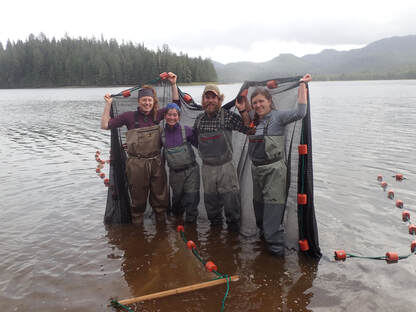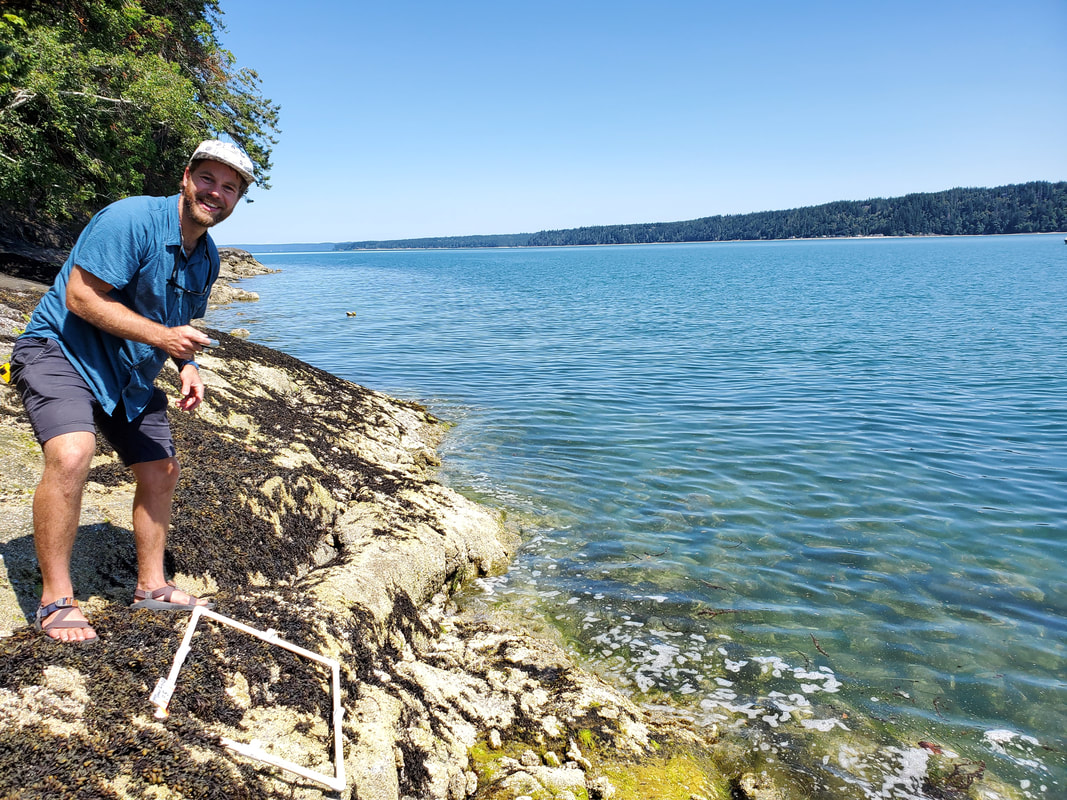ES
Wendel RaymondI am a Nearshore Ecology Research Scientist at University of Washington - Friday Harbor Laboratories. This position allows me to work on a variety of research projects with a diverse group of collaborators. I am physically based in Port Angeles, WA and would like to increase ecological research and monitoring capacity along the Strait of Juan de Fuca and outer coast of Washington. I received my PhD candidate at University of Alaska Fairbanks working with Dr. Ginny Eckert on the ecological effects of sea otter recolonization in Southeast Alaska. My work focused on the spatial and temporal patterns of subsistence sea otter harvest and the effect of sea otters in eelgrass (Zostera marina) communities and food webs (see Research). While my PhD focused on eelgrass ecosystems my interests span all marine ecosystems and species. In general, I am interested in the biological and physical drivers that affect marine communities, food webs, and their interactions. In these efforts I aspire to build on ecological theory to answer compelling questions at the interface of ecology, conservation, and management. I strive to combine multiple techniques and data sources including observational, experimental, biomarkers, data mining etc. to address such research questions. I am also interested in how the fields of spatial ecology, fatty acid and stable isotope ecology, and energy subsidies interface with community and food web ecology.
You can follow me on twitter, ResearchGate, and GitHub. |
Collaborators

Megan Dethier (University of Washington - Friday Harbor Labs): Collaborator on green tides and kelp indicator project. Co-instructor in Biodiversity and Monitoring in Esturine Ecosystems.
Helen Berry (WA Dept. Natural Resources): Collaborator on multiple nearshore projects and kelp vital sign indicator project.
Brooke Sullivan (San Juan County / University of Washington): Co-instructor in Biodiversity and Monitoring in Esturine Ecosystems and partner is monitoring the False Bay watershed on San Juan Island, WA.
Ginny Eckert (University of Alaska Fairbanks - College of Fisheries and Ocean Science): PhD adviser and lead PI of APECS.
Tiffany Stephens (Seagrove Kelp): Former post-doc on APECS project.
Brent Hughes (Sonoma State University): Senior personnel on APECS and lead PI on Sea otter - Zostera Network.
Margot Hessing-Lewis (Hakai Institute): Researcher on Sea otter - Zostera Network.
Tim Tinker (Nhydra consulting): Sea otter population dynamics in Southeast Alaska and senior personnel on APECS.
Tom Bell (WHOI): Kelp condition states and post-doc on APECS.
Helen Berry (WA Dept. Natural Resources): Collaborator on multiple nearshore projects and kelp vital sign indicator project.
Brooke Sullivan (San Juan County / University of Washington): Co-instructor in Biodiversity and Monitoring in Esturine Ecosystems and partner is monitoring the False Bay watershed on San Juan Island, WA.
Ginny Eckert (University of Alaska Fairbanks - College of Fisheries and Ocean Science): PhD adviser and lead PI of APECS.
Tiffany Stephens (Seagrove Kelp): Former post-doc on APECS project.
Brent Hughes (Sonoma State University): Senior personnel on APECS and lead PI on Sea otter - Zostera Network.
Margot Hessing-Lewis (Hakai Institute): Researcher on Sea otter - Zostera Network.
Tim Tinker (Nhydra consulting): Sea otter population dynamics in Southeast Alaska and senior personnel on APECS.
Tom Bell (WHOI): Kelp condition states and post-doc on APECS.
Mentors
I have been fortunate to have worked with some great mentors over the years! I would not be where I am today without them.
PhD committee: Ginny Eckert (UAF), Anne Beaudreau (UAF), Franz Mueter (UAF), Aaron Galloway (University of Oregon - Oregon Institute of Marine Biology)
Megan Dethier (University of Washington - Friday Harbor Labs)
David Duggins (University of Washington - Friday Harbor Labs)
Mark Hixon (University of Hawaii)
Mark Albins (University of South Alabama)
Tim Pusack (William College and Mystic Seaport)
PhD committee: Ginny Eckert (UAF), Anne Beaudreau (UAF), Franz Mueter (UAF), Aaron Galloway (University of Oregon - Oregon Institute of Marine Biology)
Megan Dethier (University of Washington - Friday Harbor Labs)
David Duggins (University of Washington - Friday Harbor Labs)
Mark Hixon (University of Hawaii)
Mark Albins (University of South Alabama)
Tim Pusack (William College and Mystic Seaport)
Diversity, Equity, and Inclusion
The sciences are not immune from the diversity and equity issues prevalent in our society and work places. I strive to foster an inclusive environment where all members of a lab or team are treated equally and feel able to bring their authentic selves into their work. Diversity is a central theme in ecological sciences and also strengthens and enriches our professional community. I believe that all backgrounds and identities, including (but not limited to) race, ethnicity, national origin, gender identity, age, faith/religion, sexual orientation, familial status, ability, and socioeconomic background contribute of a high quality research environment and society in general. A diversity of perspectives is critical to being effective scientists because it allows us to understand and solve problems in innovative ways. I recognize that overcoming institutional and cultural biases is a challenge for all of us but believe that we can all contribute to changing the status quo. I think this can be accomplished by celebrating and honoring the diversity and of our colleagues and the places we work, identifying our own biases and privilege, listening, meeting people where they are, and advocating for underrepresented minorities in the sciences.
Proudly powered by Weebly
